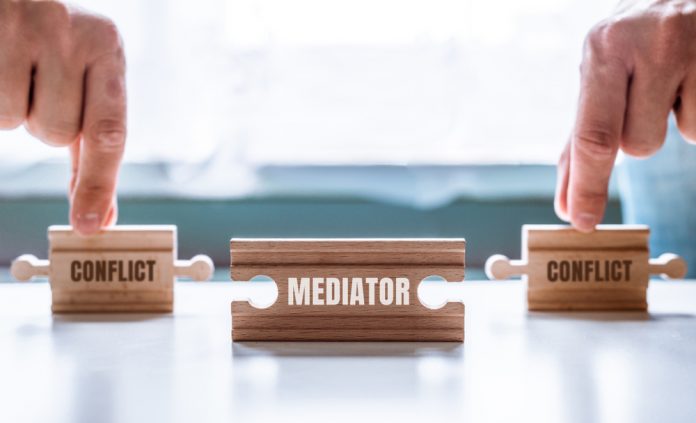This article has been authored by Jonathan Rodrigues who is a lawyer and certified mediator. Jonathan is currently serving as the Course Coordinator (Ad-hoc), M.A. Mediation and Conflict Resolution (MNLU Mumbai). He co-founded The PACT in 2016 and is set to join CAMP Mediation, Bangalore, as Mediator and Corporate Relations Lead. Check out Jonathan’s TedxTalk on Mediation.
Having invested the last five years in campaigning for exclusive attention towards mediation – spreading awareness through boot camps; creating competitive platforms to test skills and knowledge; conceptualizing and mentoring dispute resolution cells, blogs and conferences; and guiding enthusiastic individuals on the road less travelled – Mediation, finally, gets into the limelight from an academic perspective.
Maharashtra National Law University (MNLU), Mumbai, has announced a two-year MA program in Mediation and Conflict Resolution, the first of its kind post-graduate degree, beginning this autumn. It is heartening to break the news to the hundreds of eager-eyed students who would walk up to me at the end of a workshop or lecture and ask, “When will we have a special full-time course in India dedicated to Mediation?”
I have taken great pleasure and pride in instigating law students across the country to vigorously read and write about Mediation, and I believe this development in Mumbai will go a long way in generating new ideas and inspiring thought-leaders in the field of conflict resolution. Having pursued LL.M. studies in Mediation and Conflict Resolution in the UK, I know, for a fact, that this course at MNLU Mumbai is an oasis for any professional who is thirsting for something different, yet relevant to our changing times.
One glance at the consciously curated course module clarifies that participants will experience a holistic grooming in mediation and the broader subject of consensual conflict resolution. With focus shifting beyond the typical subjects constituting law courses – with papers dedicated to psychology, sociology, diplomacy, philosophy, diplomacy, business negotiations, online dispute resolution, cognitive behaviour, artificial intelligence, religion and criminal justice – the executive master’s degree will benefit any working professional, who seeks to learn and advance in her or his conflict resolution intelligence.
The 16-odd specialized papers, spread across four semesters, will be delivered by a diverse faculty comprising domain experts. The course might be forced to open online this September due to social distancing measures in place for COVID-19 in place for the city of Mumbai, but will eventually return to a physical classroom atmosphere characterized by discussions, activities, conferences, specially designed role-plays and practical simulations.
Prominently endorsed by Chief Justice of India S.A. Bobde, who is also the chancellor of MNLU Mumbai, the post-graduate course is open to graduates from any field and profession who wish to develop their mediation skills. The masters course, therefore, expects to see a classroom full of accountants, engineers, architects, lawyers, judges, bankers, doctors, business leaders, trade union leaders, HR managers social workers, teachers, media personnel, police officers, artists / artistes, hospitality executives…and literally, anyone who is passionate to be a leader and role model in the field of conflict resolution.
The course has been intricately designed by MNLU’S Centre for Mediation and Research (CMR), headed by Adv. Tanu Mehta, who is also a mediator, and a mediation post-graduate from Tel Aviv University, Israel. “A deep psychological, intellectual and emotional impact has to be made whilst training a Mediator. This is one of many aspects that motivated us to build this special master’s degree in Mediation,” says Adv. Mehta.

Under the leadership of the Vice- Chancellor, Prof. (Dr.) Dilip Ukey, and the Registrar, Mr. Vivek B. Gavhane, the course hopes to nurture a mature breed of mediation professionals, who will lead India with a fresh approach of engaging dialogue while dealing with disputes.
Mediation in India is expected to quickly emerge out of its closeted space that has been frequented by lawyers, judges and other members of the legal community. With more legislations making amendments to include a special mention for mediation and a proposed Mediation law in the pipeline, the ground for mediation in India is fertile for growth and expansion into related fields of conflicts and conflict resolution. Private mediation firms, via online forums, are storming the dispute resolution market, as business and personal communications in the times of the COVID-19 health crisis have now become virtually further accessible, though physically restricted.
Returning to India to restart my mediation journey, I am personally delighted to be a part of the genesis of the MA in Mediation and Conflict Resolution at MNLU Mumbai, and I look forward to contributing to the scholastic enhancement of mediation in India. On that note, I invite others – who find peacekeeping, conflict resolution or simply, problem-solving an area of interest – to explore the MA course and join our generation of mediators and conflict resolution professionals, as we work towards strengthening the roots of dialogue in India.
It’s time to nurture an India that listens as much as it speaks, where diverse and contradictory perspectives are accepted and respected and consensually admitted into society.
LawSikho has created a telegram group for exchanging legal knowledge, referrals and various opportunities. You can click on this link and join:
 Serato DJ Crack 2025Serato DJ PRO Crack
Serato DJ Crack 2025Serato DJ PRO Crack










 Allow notifications
Allow notifications


